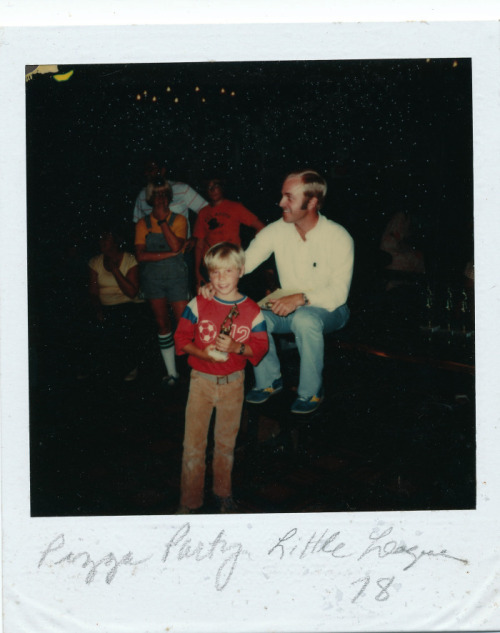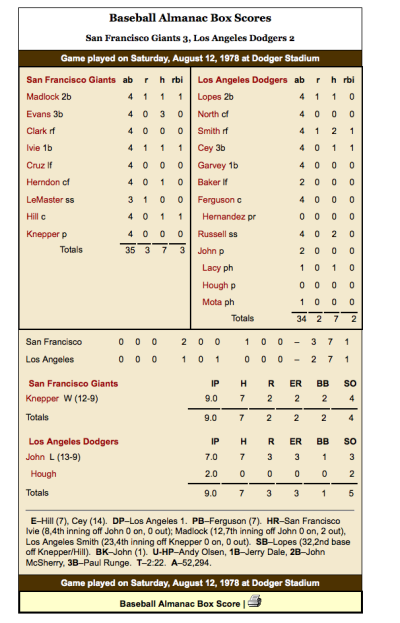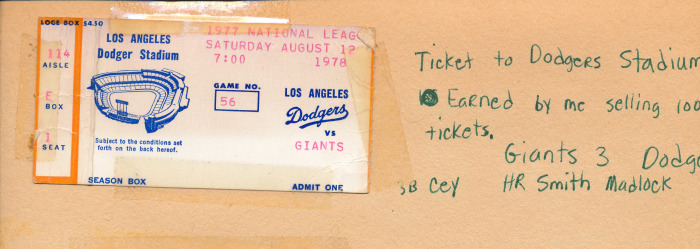Father's Day
“You’ve got Father’s day. Mom’s got Mother’s day. Why isn’t there a kid’s day?”
My dad sat in his chair reading the Sunday paper as I pressed him for an answer. “Because everyday is kid’s day.” He said matter of factly—like water is wet.
“No it isn’t!” I replied—annoyed at one of those parental phrases meant to justify the unjustifiable. He might as well have just said, “Because I said so.”
He was right of course—but there was something he wasn’t telling me. Every kid’s day is really a kind of father’s day too. And no kid ever had a better strings of kid’s day than I did—with my dad—more than thirty years ago.
I was nine years old in the spring of ’78. We lived in Foster City, California; third grade was winding down and change was brewing in our house. I overheard my parents talking about the unthinkable—we were going to move to some place called New Jersey! But before we would pack up everything and move three thousand miles away, baseball would provide one last spectacular summer for me in California—better than any little boy could have dreamed up.
I was a Little League Dodger—in Giant’s country. I wore number six, because Steve Garvey was my hero. My dad was the coach. He was thirty years old—blonde and handsome. With his gold sunglasses, long side-burns and a mustache, he looked like an off-duty Highway Patrol officer from the first season of the 70’s TV show CHIPS. (I wish I had a really good photo of him with the glasses to show you, but you’ll just have to trust me.)

Dad wasn’t a ‘baseball-man’, but he was an organizational freak-of-nature. He ran his practices like he ran his group of computer programmers at IBM; every activity was meticulously planned down to the minute—that was the secret to his success.
Like all Little Leagues, we needed money. The fundraiser that year was changed from selling Almond Roca to selling tickets to a Giants-Reds game at Candlestick—they were dollar-fifty nosebleed seats, but the Big Red Machine was still intact. (Pete Rose would later leave Cincinnati after that season.)
I remember staring at the paper that had the fundraiser’s rules and incentives on it:
- · Sell 25 tickets: You get a batting glove.
- · Sell 50 tickets: A Giants baseball cap.
- · Sell 75 tickets: A new Rawlings glove.
- · Sell 100 tickets: 2 box-seats for a Giants-Dodgers game at Dodgers Stadium in LA
I really wanted that trip to Los Angeles! I made flyers for the game. I remember that I spelled Cincinnati—Cincinati. (then had to add another ‘n’ with a little arrow smushed above and between the other letters.)
Before I was allowed to leave the hous, my dad made me give my pitch to him first.
“Hello, my name is John Keenan and I play for the Dodgers. I’m selling tickets to the San Francisco Giants game against the Big-Red Machine.” (My dad added that part. He said I needed to sell Pete Rose and Johnny Bench, not the Giants—even though they were having a good year.) “How many tickets can I mark you down for?” Then, I would flash my ‘cute-little-blonde-kid smile’ and finish off the pitch with, “The Foster City Little League really needs the money.”
With my dad’s seal of approval, I walked out the first day armed with a secret weapon. Dad printed up little 3x5 order forms with all the key information on it. Most importantly, it had my name and number on it. I started with the neighbors and gradually moved beyond. When someone opened the door, I gave my pitch. Regardless of whether they said yes or no, I handed everyone an order form. To the yes people I said, “In case you want more.” To the no people I said, “In case you change your minds or know anyone else who wants any tickets.” If nobody was home, I just slipped an order form and a flyer under the door. I must have knocked on every door within walking distance of our house.
Turns out, I was quite the dedicated little salesman. I sold a ton door-to-door and the order form strategy worked like a charm. Pretty soon people were calling me—asking for tickets. With just a couple of days to go, I had sold 96 tickets. I pounded the pavement again. I went to grocery stores, gas stations, any place I could think of—but with little luck. Then, a day before the deadline, the flyers paid off again. A couple of phone orders put me over the top!
I did it! Two box seats at Dodger Stadium. Round trip airfare. A free night at the Marriot hotel in Los Angeles. The grand prize was mine, but then some dastardly adults tried to ruin everything. It turns out the league never expected anybody to win and didn’t want me to go to Los Angeles.
Dad took me outside one night for a talk. League officials wanted to buy me out—bribe me not to go. He explained their offer. Four box seats to a game of my choice at Candlestick and a hundred bucks! That was a heck of a lot of money in 1978 for a nine year old kid. I was probably only getting twenty five cents a week in allowance. Dad said it was up to me.
“I want to go to Dodgers stadium!” I said without hesitation. True to his word, he let my decision stand and saw to it that the league honored its promise.
While we waited for the league to come through with the trip, we still had a season to play. We were a good team, but we caught a bad break in the middle of the season. One of our best players, Darren, was drafted into a higher league. Everybody was bummed out—including Darren. We lost the next game and our prospects for a championship started to look dim.
Suddenly, something incredible happened. Jeff Brodie started hanging around the baseball fields. He had been on my team the previous year, but had decided not to play anymore for some reason he wouldn’t tell us. I first noticed him sitting in the stands during one of our games. He was all by himself.
After several more sightings, My dad went over and had a long conversation with Jeff. Dad never told me what they talked about, but suffice it to say, he asked him if he wanted to join the team. Jeff said yes and my dad made it happen. At the time, Dad explained that he too had quit playing baseball as a kid and he always regretted it. He said he wanted to spare Jeff from the same mistake. When I asked if perhaps the fact that Jeff was the best hitter on the team last year didn’t play a role in his decision—dad said, in his pithy way, “That’s a bonus!”
I know what you’re thinking—this is the plot to the Bad News Bears and Jeff Brodie is Kelly Leake. Next thing you’re gonna say is that you brought in a girl pitcher, played by Tatum O’Neal, and she pitched you to the championship game. I know it sounds crazy, but it’s true—I swear to God, this really happened!
With Jeff batting fourth, we won the championship—I caught the last out and everybody went crazy! We went out for pizza after the game. The following weekend, we had an official team party at Jeff Brodie’s house—he had a pool. Dad gave out awards to everybody on the team. Jeff got the MVP for saving our season.

A few weeks later, the parents organized a team picnic and we celebrated again. We even had a mother-son baseball game. I thought it was a crazy idea until I saw them hit—the moms team had at least four ringers on it. They kicked our butt—it was incredible. I still, to this day, can’t believe that the Little League Dodgers won the championship, but lost to our moms.
On Saturday morning August 12, 1978 mom dropped us off at the airport. It was my first plane ride. At LAX dad sprung for a rental car—a Ford Fairmount. On the way to the hotel we ate at a diner—hamburger and fries.
In the elevator at the hotel, I watched the floor numbers lighting up like an arcade game. I remember thinking how cool it was that our room was so high in the air that we had to take an elevator to get to it.
It was more than just a baseball game at Dodgers stadium, it was Hollywood stars night. Billy Crystal, Ron Howard and other big celebrities of the day played a game before the game. Dad pointed out one of his favorite stars—Steve Martin—who was playing rover and entertaining the fans with his ‘wild and crazy guy’ antics.
Our seats were a dozen or so rows behind the visitor’s dugout; we had a great view into the home team dugout. When the Dodgers took the field I cheered my brains out. Ron Cey, Dusty Baker, and Davey Lopes—they ran out to their positions like an army of marauders storming the beach. “There’s Steve Garvey!” I yelled and pointed. With those huge forearms, he looked like a gladiator—carved from stone.
Tommy John was the starting pitcher for the Dodgers. (A miracle unto itself, considering a few years earlier he was the guniea pig for the greatest medical advancement in the history of baseball. His name would forever be linked to the career-saving elbow surgery invented by Dr. Frank Jobe.) Bob Knepper pitched for the Giants. Garv took an o’fer, but he saved Bill Russell from an error with one of his signature scoops at first base.
When I wasn’t cheering, I was chomping. I filled my belly with hot dogs, crackerjack, and soda. On one of his trips back from the vendor, dad surprised me with a Dodger helmet. I put it on my head over my hat and wore it everyday for a week. I’m 43 now and I still have it.
We saw some homers too. Reggie Smith hit a bomb to centerfield. Unfortunately, the Giants hit two—one by Bill Mad-Dog Madlock—the other by Mike Ivie. The Dodgers lost 3-2 and I fell asleep in the Fairmount on the way back to the hotel.

We flew back to San Francisco in the morning. Mom picked us up at SFO and asked me, “How was the game?”
“The Dodgers lost, but we had the best time!” I shouted—then I hugged her and told her all about it on the drive home.

In 1978, the Dodgers became the first team in history to draw three million fans—and my dad and I helped put them over the hump. Even now, at 43, I marvel about what a wonderful summer we had. So, with respect to Father’s day, everybody raise a glass—because I would like to propose a toast…
To all those dads out there who take Kid’s Day seriously—like mine—Cheers!